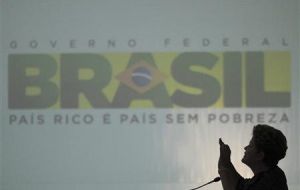MercoPress. South Atlantic News Agency
Rousseff calls emergency cabinet meeting; a million people took to the streets in capital cites
 The Brazilian president followed the demonstrations in Brasilia from the Planalto Palace
The Brazilian president followed the demonstrations in Brasilia from the Planalto Palace Brazilian president Dilma Rousseff has called for an urgent meeting of her main ministers Friday morning to address the effects of the current demonstrations through out Brazil which on Thursday evening convened over a million people in eighty cities.
According to the leading newspaper Folha de Sao Paulo, Rousseff followed the protests in Brasilia from the Executive Planalto Palace protected by special forces and surrounded by demonstrators, and before leaving for the official residence decided on the emergency meeting.
When she was leaving for the Alvorada Palace reports came in that the seat of the Foreign Affairs ministry, Itamaraty was under attack from violent groups of protestors.
The emergency meeting will assess the extent and depth of the protest in the different cities and then decide what measures the government is to follow such as the intervention of the Ministry of Justice and probably a speech from Rousseff to the nation.
So far President Rousseff only made a brief reference to the protests last Tuesday when the launching of the Minerals Code bill presented to Congress. At the time the president said she supported the demonstrators because as her “they want a better country” and have done so flying Brazilian flags and chanting the national anthem.
According to police reports it is estimated that over a million people took to the streets on Thursday including 25 state capitals with clashes in at least thirteen of them. Rio do Janeiro convened the largest number, 300.000 people. In nine of the thirteen capitals with clashes there were acts of vandalism with attempts to destroy government and private property, mainly local governments, councils and Justice courts.
In Brasilia protestors trying to break into Congress were contained and expelled by police using tear gas and in Rio there was a battle in front of Town Hall as marchers tried to break in letting off fire works. Police reacted with stunt bombs and later the cavalry dispersed the most aggressive groups.
Meanwhile the chairman of the Workers Party Rui Falcao called on members and followers to abstain from participating in the demonstrations, thus reversing an earlier invitation to join the protests.
The Workers Party original strategy was in support of President Rousseff’s statement praising demonstrators and from her political mentor, former president Lula da Silva, who had adopted a similar approach.
In an interview with Folha de Sao Paulo published on Thursday Falcao had called for party militants to join the protests speared by the Free-Tickets Movement.
He added from his twitter, “to the streets; PT (Workers Party) to the streets!! The fight for decent public transport has been a historic demand from PT!!”.
However early afternoon the messages were exactly the opposite; “keep out of the streets: no demonstrations”.




Top Comments
Disclaimer & comment rules-

-

-

Read all commentsYou cant promise your people a western thriving democracy full of opportunities and wealth and then continue to govern your country like, well, a south american!
Jun 21st, 2013 - 07:07 am 0“”“”“Police reacted with stunt bombs”“”“””
Jun 21st, 2013 - 09:35 am 0I wish our police had stunt bombs - they sound rather groovy
Brazil's street demonstrations are horribly significant, because they represent the increasing fragility of governments in the face of extreme income inequality. Expect a new variation of the Arab Spring who knows where? Latin America?
Jun 21st, 2013 - 11:37 am 0Commenting for this story is now closed.
If you have a Facebook account, become a fan and comment on our Facebook Page!